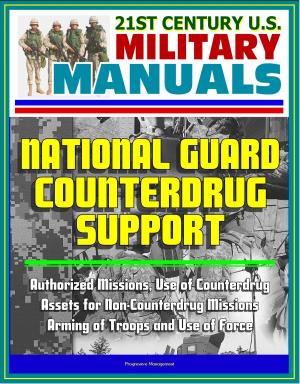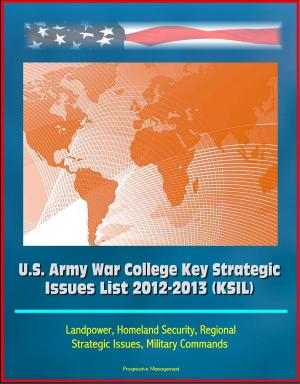Iraq Reconstruction Special Reports: Five Official Reviews, Hard Lessons, Human Toll of Reconstruction or Stabilization Operations During Iraqi Freedom, Perception of Emergency Response
Nonfiction, History, Middle East, Military| Author: | Progressive Management | ISBN: | 9781301267255 |
| Publisher: | Progressive Management | Publication: | September 14, 2013 |
| Imprint: | Smashwords Edition | Language: | English |
| Author: | Progressive Management |
| ISBN: | 9781301267255 |
| Publisher: | Progressive Management |
| Publication: | September 14, 2013 |
| Imprint: | Smashwords Edition |
| Language: | English |
Five vital reports about the results of Iraq War reconstruction efforts by the United States are compiled in this unique ebook. Documents in the collection:
Iraq Reconstruction Special Report: Reconstruction Leaders' Perceptions of the Commander's Emergency Response Program in Iraq - Since 2004, the Congress authorized almost $4 billion for the Department of Defense's (DoD) Commander's Emergency Response Program (CERP) in Iraq. The CERP's purpose was to enable commanders to respond to urgent humanitarian relief and reconstruction requirements within their areas of responsibility by carrying out programs and projects that provided immediate support to the Iraqi people. American Commanders in Iraq used CERP funds to build schools, roads, health clinics, sewers, and for non-construction projects like micro-grants to support economic development and condolence payments.
The Human Toll of Reconstruction or Stabilization Operations during Operation Iraqi Freedom - SIGIR identified a total of 719 people killed while engaged in reconstruction or stabilization activities in Iraq between May 1, 2003, and August 31, 2010. This number includes 318 Americans (U.S. military, federal civilian employees, and U.S. civilian contractors), 111 third-country nationals, 271 Iraqis and 19 of unknown nationality who were working in support of the U.S. reconstruction or stabilization mission during Operation Iraqi Freedom.
Applying Iraq's Hard Lessons to the Reform of Stabilization and Reconstruction Operations - This paper addresses—and proposes an answer to—the question of who should be accountable for planning, managing, and executing stabilization and reconstruction operations (SROs). This paper suggests a new and comprehensive solution, comprising a collection of targeted operational reforms and the creation of an integrated management office—the U.S. Office for Contingency Operations (USOCO)—that would be accountable for planning and executing SROs.
Hard Lessons: The Iraq Reconstruction Experience - Hard Lessons answers some important questions about the U.S. relief and reconstruction program in Iraq: Did the program meet the goals it set for itself? Generally no on the infrastructure front, but generally yes regarding the development of Iraq's security forces. Was the program grossly burdened by waste and fraud? Regarding waste, yes; regarding fraud, no. The overuse of cost-plus contracts, high contractor overhead expenses, excessive contractor award fees, and unacceptable program and project delays all contributed to a significant waste of taxpayer dollars. Although SIGIR and other law enforcement agencies have uncovered egregious examples of fraud, the size of the total criminal wrongdoing known to date amounts to a relatively small percentage of the overall reconstruction investment, and the number of individuals involved was relatively low. The vast majority of those who served the U.S. reconstruction program—soldier, civilian, and contractor— did so honorably. Why did reconstruction efforts so often fail to meet their mark? Security.
Lessons Learned from Investigations, 2004-2012 - Special Inspector General for Iraq Reconstruction - The Iraq reconstruction experience produced a plethora of lessons about what happens when a stabilization and reconstruction operation (SRO) commences without sufficient systemic support in place. Among the most salient is the need to provide a robust on-the-ground team of investigators and auditors from the outset of such an operation.
Five vital reports about the results of Iraq War reconstruction efforts by the United States are compiled in this unique ebook. Documents in the collection:
Iraq Reconstruction Special Report: Reconstruction Leaders' Perceptions of the Commander's Emergency Response Program in Iraq - Since 2004, the Congress authorized almost $4 billion for the Department of Defense's (DoD) Commander's Emergency Response Program (CERP) in Iraq. The CERP's purpose was to enable commanders to respond to urgent humanitarian relief and reconstruction requirements within their areas of responsibility by carrying out programs and projects that provided immediate support to the Iraqi people. American Commanders in Iraq used CERP funds to build schools, roads, health clinics, sewers, and for non-construction projects like micro-grants to support economic development and condolence payments.
The Human Toll of Reconstruction or Stabilization Operations during Operation Iraqi Freedom - SIGIR identified a total of 719 people killed while engaged in reconstruction or stabilization activities in Iraq between May 1, 2003, and August 31, 2010. This number includes 318 Americans (U.S. military, federal civilian employees, and U.S. civilian contractors), 111 third-country nationals, 271 Iraqis and 19 of unknown nationality who were working in support of the U.S. reconstruction or stabilization mission during Operation Iraqi Freedom.
Applying Iraq's Hard Lessons to the Reform of Stabilization and Reconstruction Operations - This paper addresses—and proposes an answer to—the question of who should be accountable for planning, managing, and executing stabilization and reconstruction operations (SROs). This paper suggests a new and comprehensive solution, comprising a collection of targeted operational reforms and the creation of an integrated management office—the U.S. Office for Contingency Operations (USOCO)—that would be accountable for planning and executing SROs.
Hard Lessons: The Iraq Reconstruction Experience - Hard Lessons answers some important questions about the U.S. relief and reconstruction program in Iraq: Did the program meet the goals it set for itself? Generally no on the infrastructure front, but generally yes regarding the development of Iraq's security forces. Was the program grossly burdened by waste and fraud? Regarding waste, yes; regarding fraud, no. The overuse of cost-plus contracts, high contractor overhead expenses, excessive contractor award fees, and unacceptable program and project delays all contributed to a significant waste of taxpayer dollars. Although SIGIR and other law enforcement agencies have uncovered egregious examples of fraud, the size of the total criminal wrongdoing known to date amounts to a relatively small percentage of the overall reconstruction investment, and the number of individuals involved was relatively low. The vast majority of those who served the U.S. reconstruction program—soldier, civilian, and contractor— did so honorably. Why did reconstruction efforts so often fail to meet their mark? Security.
Lessons Learned from Investigations, 2004-2012 - Special Inspector General for Iraq Reconstruction - The Iraq reconstruction experience produced a plethora of lessons about what happens when a stabilization and reconstruction operation (SRO) commences without sufficient systemic support in place. Among the most salient is the need to provide a robust on-the-ground team of investigators and auditors from the outset of such an operation.















